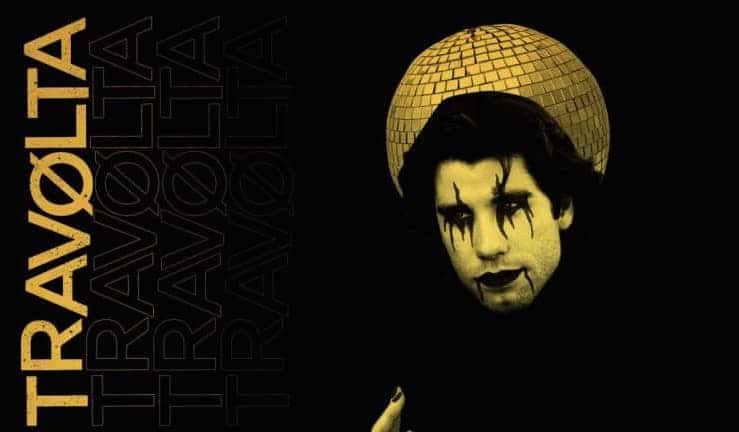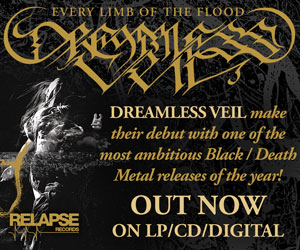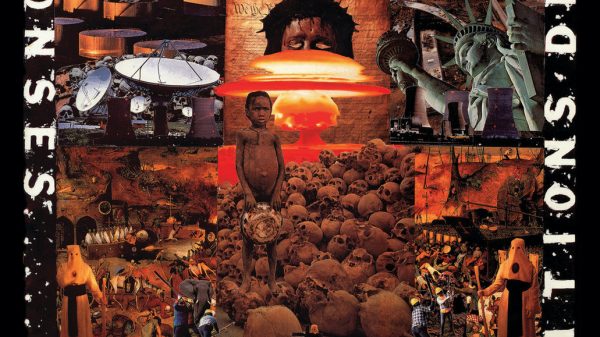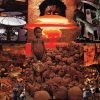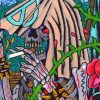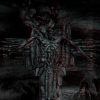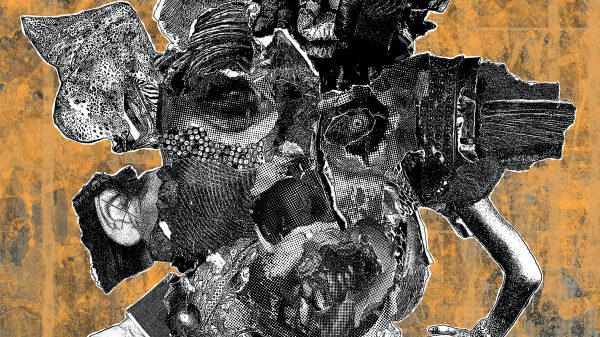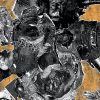Though Travølta’s new release In Tinnitus We Crust will have any die-hard fan of d-beat, crust, fastcore, grindcore, and powerviolence drumming their steering wheel into oncoming traffic, this release shows them as worthy bearers of the mincecore torch, originally lit by their Belgian forebears, Agathocles. The production is no-nonsense. Raw. Honest. You hear every instrument in its real form, giving this LP an intimate, live feel, as if you’re a fly on the wall of the band’s rehearsal space. Travølta manages to find that rare balance of fun and fury by clearly loving what they do and by having a legitimate bone to pick with the world at large. Pissed off and unafraid to piss others off, they wear their politics on their sleeves, speaking out against prejudice in all its forms and doing so with Nico’s genuine, screaming rage.
Along with cleverly placed samples (including one from Doug Stanhope, which made this Arizona boy proud), Travølta’s tempo changes bring the violence to this record, and they are perfectly calibrated for a street riot. Rik’s blast-beat clashes give way to the persistent, intentional rhythm of slow marching, and then to the explosions of bricks through windows. The punchiness of Kevin’s bass sounds like early punk, like The Stooges, Minutemen, or The Clash if they had to keep at pace with Niels’ furious right hand, which alternates between fast-picked riffing and chunky, punch-a-hole-in-your-local-racist power chords.
These are the sounds of blasted barricades.
These are the sounds of broken batons.
These are the sounds of Belgium, and these powerviolence stalwarts have outdone themselves on their new album In Tinnitus We Crust, out now through Loner Cult Records.
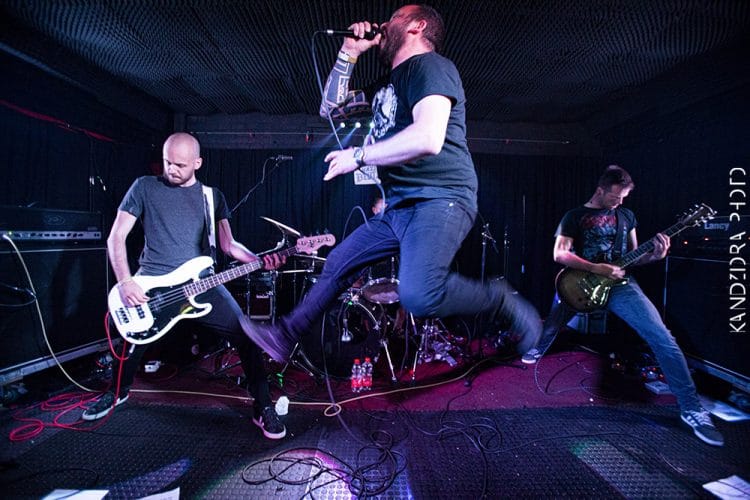
In 2017, you released a comprehensive discography. How has your music and/or your approach to writing music changed since then?
Travølta started with two friends who never played the instrument they’re playing now. So on the first two releases, the music was very straight-forward hardcore punk mixed with power-violence and D-beat. The music, however, got a bit more sophisticated in its structure with a more-or-less grinding feeling to it, which is already noticeable on the Marxbros split LP. But from that point onwards, more death metal got involved together with a substantially metallic sound and riffing. Lots of double bass, thrashing riffs, hyperfast bass licks, and yet crusty vocals!
Who do you consider to be the biggest influences in your sound? What bands inspired you to play this music, and what artists are you listening to now?
We’re four individuals with different backgrounds, ideas and interests. Therefore, I need everybody to speak for themselves here.
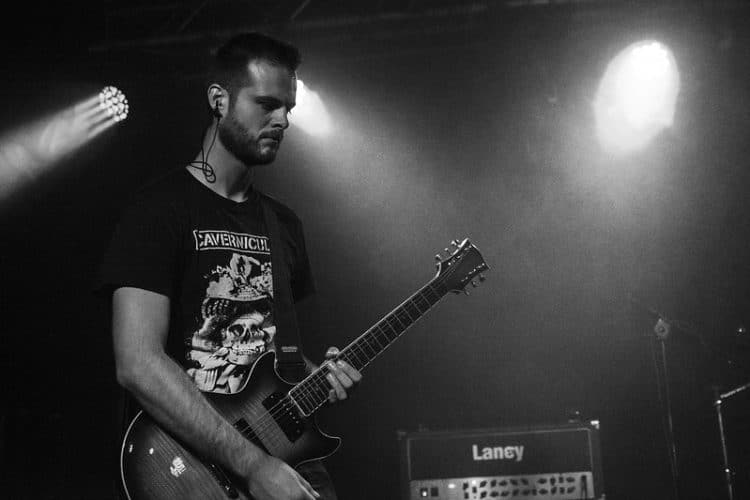
Niels: My biggest influence and inspiration might be the Disgorge Mexico-era Fuck The Facts, and La Revancha by Spazz. Not so much because of the sound, but because of the unorthodox playing style they have. I absolutely dislike playing an intro-verse-chorus-style kind of music like the old punks did. The artists I’m listening to on a regular basis are Insect Warfare, Hatred Surge, PLF, Whoresnation, Wormrot, Hellnation, but also Iron Maiden, Martyrdöd, Congress, Slayer, and Bolt Thrower find their way to my ears easily!
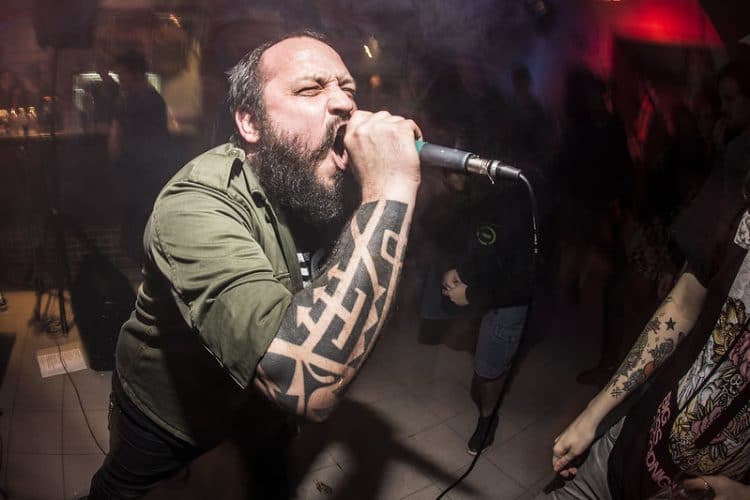
Nico: I have always been a sucker for raw HC/Punk bands with an outspoken message. Bands like Ripcord, Heresy, Agathocles, Nations On Fire, Hiatus, Dropdead, Assück, Mob 47, Lärm, Manliftingbanner, Seein’ Red, Disrupt, Aus Rotten, Burnt Cross, Rorschach, Acme, WarCry, The Now Denial, etc. are frequently on this old punk’s playlist. But lately, also some old blues (Leadbelly, Woody Guthrie, Blind Willie Mc Tell) slips in too, pretty pure and raw stuff as well. The record I listened the most to since 2008 is probably the “Live The Storm” album by Disfear. It’s a more-than-outstanding crust punk record that can be played every single moment of the day or for any occasion, even waking up.
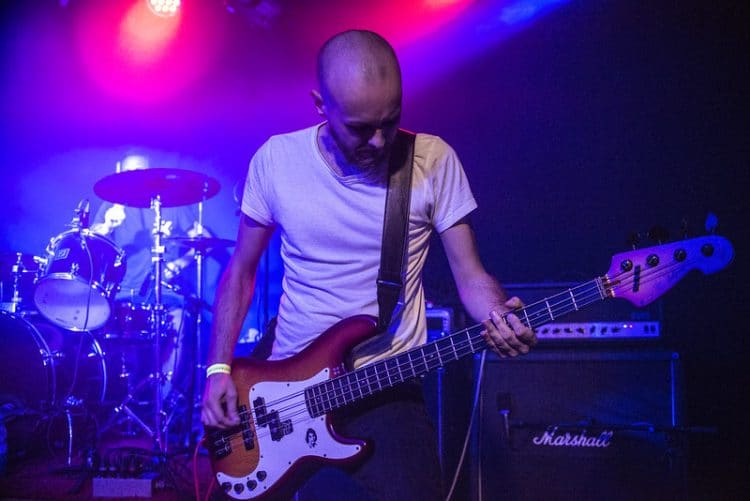
Kevin: What inspires me the most to do what I do is the lack of definition a lot of bands in the genre struggle with. Therefore, I refuse to play with a bass tone that sounds similar to the latest Dyson Vacuum cleaners. The aggressive and top-end bass tone I use really compliments Niels’ heavy guitar tone. I’ve always had a punky style of playing bass guitar and I’m mostly influenced by bands who have really funky or melodic bass players who also use a treble/mid-heavy sound. Think of Anti-Flag, Mötörhead, Iron Maiden, Primus, Guns ‘n’ Roses, Rush, etc. So when it comes to Travølta, I’m really the odd one out. But regarding our overall sound, I see that as a good thing.
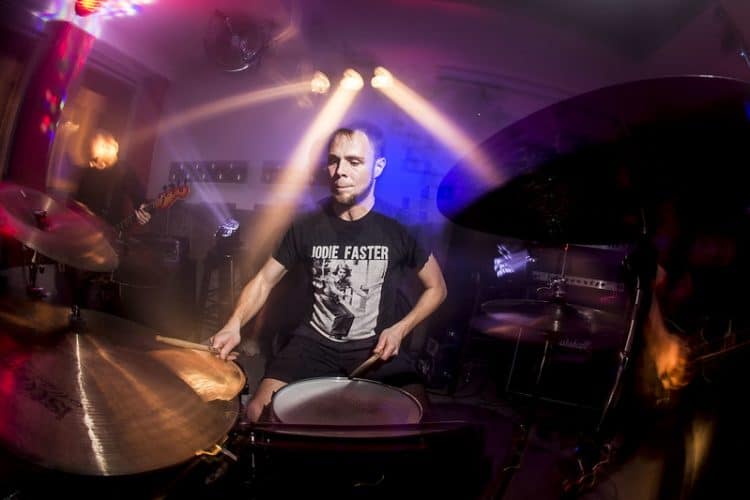
Rik: I think that Extortion (Degenerate LP) and
Disgust (A World Of No Beauty LP) were big influences when we started
making songs. The old songs were way more punky than what we’re writing now.
The newer songs have faster parts but also do slow down more often, songs
aren’t based on D-beat anymore. Some bands that influenced me on the newer
recordings are the following: Massgrave (D-beat and blastbeats, true love!),
ACXDC, Bolt Thrower (the slower mid-tempo stuff Travølta), Shikari (1 or 2
songs) and maybe even Merauder (We even have a slow songs without blasts…).
In my spare time, I like to listen to more than powerviolence and grind. I
adore 90’s hardcore because I grew up with this music. Artists like Morning
Again, Unbroken, Damnation A.D., Integrity, Liar, Congress, and many others
have a place in my heart. I’m a sucker for nostalgia! Stuff like Incantation,
Death, and Bolt Thrower feeds my need for metal. In these cold and dark days, I
listen to black metal, Shining (III-Angst and IV-The Eerie Cold), Darkspace, and
Nightbringer being absolute favourites of mine.
You have released excellent splits with Marxbros (featuring Chris Dodge and the Van Den Berg brothers), Gewoon Fucking Raggen, Boom, and Days of Desolation. Can you describe the collaborative process for those releases? Has working with those bands influenced your creative process at all?
We’re super happy to have released those splits with them. They’re all really great bands involving really kind people. But up until now, we’ve always got our songs ready and recorded before the other bands, after which we had to wait, like little children to open their birthday present, to hear which songs they wrote to put on the split. The cool thing is that by releasing a split, you really get some kind of bond with the other band. It’s always nice to see each other again after a while! Releasing the splits didn’t really influence our writing, but it influenced the way we look towards each other. This of course in a positive way!
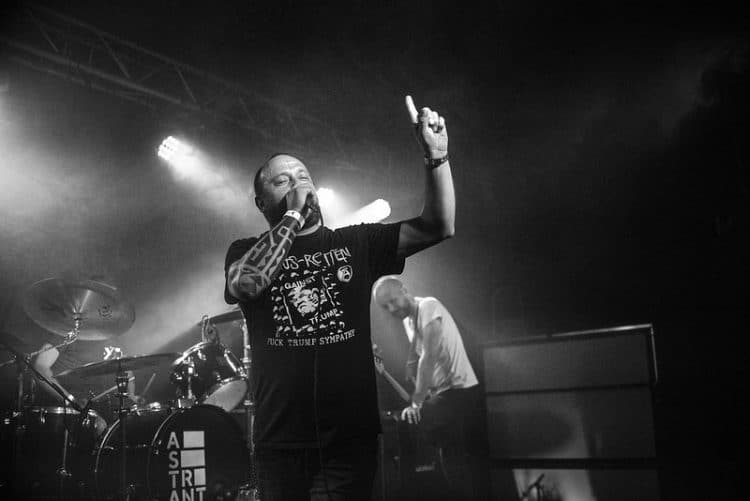
You are openly anti-discrimination. Racism, homophobia, transphobia, and other forms of discrimination are major issues in the United States at the moment. Are these problems prevalent in Belgium? How have European audiences responded to your integration of social justice and politics into your music?
Let me save you from the very complicated political situation in Belgium, but here is a short summary. The southern half of Belgium is mainly socialist-oriented and has a clear view on the future we cannot vote for because of the system. The northern half, where we live, is mainly right-wing oriented. This does not mean that every person in Flanders is racist, but there is a clear tendency towards right-wing parties. It’s gotten so sad that people who are fed up with the government even vote far-right just not to vote for the labour party who is at the extreme left wing of the spectrum. But by doing that and giving more power towards the far-right, it seems to be okay to be openly racist, homophobic, and such. This is definitely not okay for us. The extreme punk scene in Belgium is openly left-wing, so reactions are obviously positive. Playing for a right-wing and/or so-called “non-political” audience… that might be a bit more difficult. But that would never happen, I guess. Nico not only writes this down in lyrics but also openly explains this to the audience. Old punks find it amusing, youngsters however tend to focus more on the music. There are always ups-and-downs on spreading a political message, but they must never forget: Grind is Protest (cf. Agathocles).
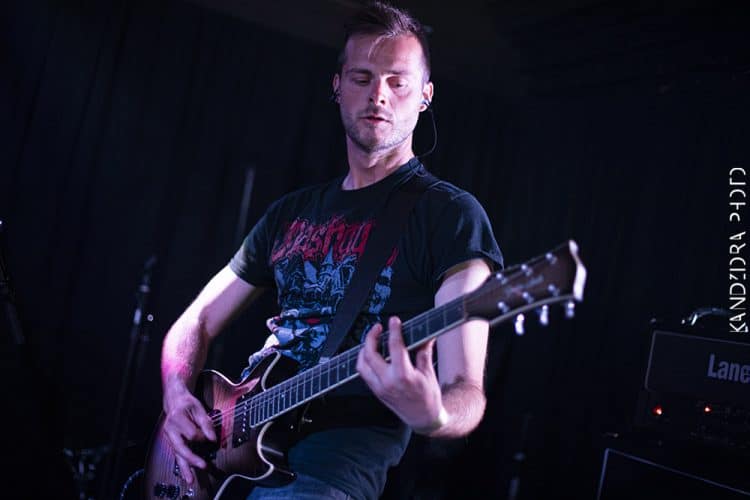
Metal and punk appear to be thriving in the U.S., Canada, and Mexico at the moment, but it is sometimes hard to have a clear perspective about what is going on musically in other parts of the world. What should North American audiences know about the heavy music scene in Belgium? What are some bands we should be listening to?
Belgium might be or might not be known for some big heavy bands now and in the past like Agathocles, Aborted, Congress, Liar, Rise and Fall, Leng Tch’e. The underground scene, however, is more divided, and a mixed concert of metal, hardcore, punk will almost never happen. So it’s very hard to give a nice overview about the first two heavy genres. In the punk scene, you really need to check out CLCKWS, Hetze, Days of Desolation, Arrogänt, Reproach, Raw Peace, Visions Of War, Pebble, Haemers, Permanent Debt, Diss Guy, Genocidal Terror, Matrak Attakk, Silence Means Death, SlaveMaker, Assur, and Lifespite to name a few. Oh, and Agathocles should be mentioned here again!
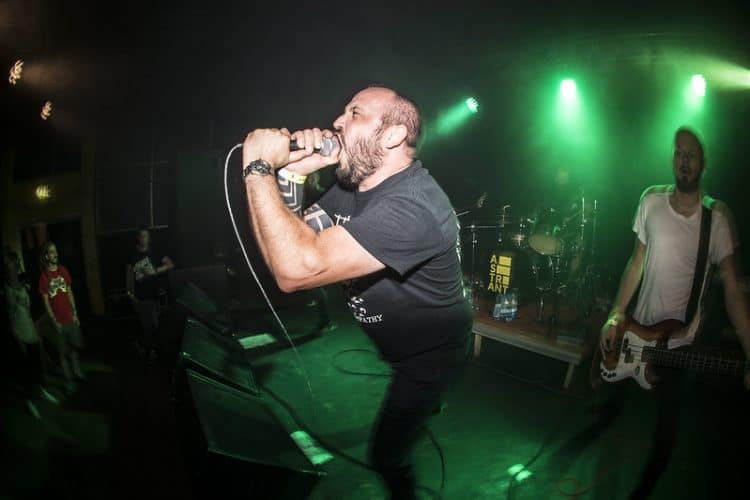
Some of your splits have featured non-Belgian bands. Boom is from France, and Gewoon Fucking Raggen and Marxbros (with the exception of Dodge) are from the Netherlands. Though these countries are relatively close, geographically, would you say that there are clearly defined Belgian, French, and Dutch sounds? If so, how would you describe those differences?
The only specific thing you hear listening to Marxbros (who sing in Dutch) and Gewoon Fucking Raggen is that they have a Dutch accent of speaking English. Also, our singer speaks kind of Kenglish* (laughs). Furthermore, the sound of each of those bands is not really specific for their country or whatever. They play what they want to play and have a kind of unique style of bringing and writing their music. What I might feel is that, nowadays, punk in Flanders is based on a hoompa-kinda drum beat, which I totally dislike, and that the southern part of Belgium and northern France focuses on a clear and almost non-distorted guitar sound. But it seems they’re changing it right now. So… hardcore punk is borderless!
*Author’s Note: Kenglish is a mix of English and Kempisch, a Flemish dialect.
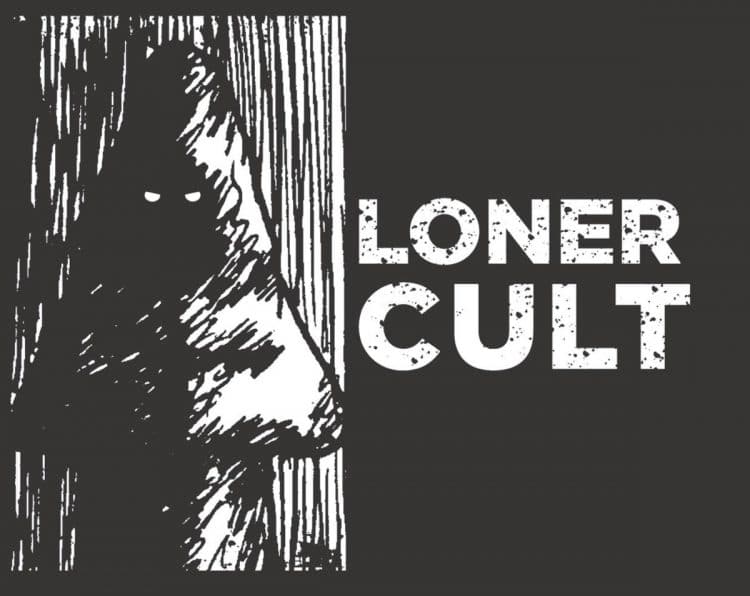
Nico, Niels and Rik also run the Loner Cult Records label, which you started in 2016. How has starting a label affected your work with Travolta? How do you balance the two responsibilities?
My first focus is still writing riffs for Travølta; Loner Cult is second place. I tend to hand it over to Nico and Rik. However, if there’s a release I really want to do I’ll definitely do my part, which was the case for Suffering Quota’s Life in Disgust, The Meth Leppard/Jack split 7” and the Powerchuck/Sordø split 7”. Each of us has his favourite kind of music, and Rik & I represent the more blastbeat way of drumming, while Nico believes in the d-beat. But the credits for this label obviously go towards the other two. Doing this label also creates opportunities for Travølta because you grow to know so many people having record labels or bands. It opens extra doors for touring or having your records spread through Europe, United States, Australia and even Japan.
Support Belgian Powerviolence by picking up Travølta’s new release here.

